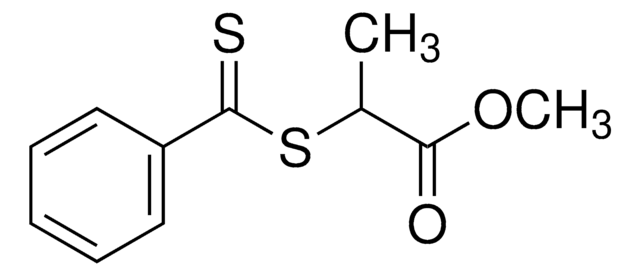900152
2-[[(2-Carboxyethyl)sulfanylthiocarbonyl]-sulfanyl]propanoic acid
Sign Into View Organizational & Contract Pricing
All Photos(2)
About This Item
Empirical Formula (Hill Notation):
C7H10O4S3
CAS Number:
Molecular Weight:
254.35
MDL number:
UNSPSC Code:
12352106
PubChem Substance ID:
NACRES:
NA.23
Recommended Products
General description
- A stable, trithiocarbonate chain transfer agent (CTA), also referred to as a RAFT agent, which can control chain growth in free radical polymerization producing polymers with well-defined molecular weights and low polydispersities.
- 2-(2-Carboxyethylsulfanylthiocarbonylsulfanyl)propionic acid may be used to control homo- and co-polymerization of acrylic acid, acrylates, acrylamides, styrenes, methacrylates, and methacrylamides. It is soluble in aqueous and organic media (amphiphilic).
Caution
Storage conditions: Room temperature, protect from light.
Legal Information
Sold for research purposes only: See sigma-aldrich.com/raftlicense. Patents: WO98/01478, WO99/311444.
Storage Class Code
11 - Combustible Solids
WGK
WGK 3
Flash Point(F)
Not applicable
Flash Point(C)
Not applicable
Choose from one of the most recent versions:
Already Own This Product?
Find documentation for the products that you have recently purchased in the Document Library.
Customers Also Viewed
Synthesis of Dual-Functional Poly(6-azidohexylmethacrylate) Brushes by a RAFT Agent Carrying Carboxylic Acid End Groups.
Cimen D, et al.
Journal of Polymer Science Part A: Polymer Chemistry, 53, 1696-1706 (2015)
Synthesis and Evaluation of New Dicarboxylic Acid Functional Trithiocarbonates: RAFT Synthesis of Telechelic Poly(n-butyl acrylate)s.
Wang R, et al.
Macromolecules, 38, 9518-9525 (2005)
Scale-up of the Reversible Addition-Fragmentation Chain Transfer (RAFT) Polymerization Using Continuous Flow Processing.
Micic N, et al.
Processes, 2, 58-70 (2014)
A Continuous Flow Process for the Radical Induced End Group Removal of RAFT Polymers.
Hornung H, et al.
Macromolecular Reaction Engineering, 6, 246-251 (2012)
RAFT Inverse Miniemulsion Polymerization of Acrylic Acid and Sodium Acrylate.
Ouyang L, et al.
Macromolecular Reaction Engineering, 5, 163-169 (2011)
Articles
Low-cost, high-purity RAFT Agents are vital for industrial RAFT polymerization. We supply effective agents for this technology.
The modification of biomacromolecules, such as peptides and proteins, through the attachment of synthetic polymers has led to a new family of highly advanced biomaterials with enhanced properties.
Our team of scientists has experience in all areas of research including Life Science, Material Science, Chemical Synthesis, Chromatography, Analytical and many others.
Contact Technical Service
![4-Cyano-4-[(dodecylsulfanylthiocarbonyl)sulfanyl]pentanoic acid 97% (HPLC)](/deepweb/assets/sigmaaldrich/product/structures/204/925/30ae6ca0-5b0b-4963-a061-7e5e3d1a85af/640/30ae6ca0-5b0b-4963-a061-7e5e3d1a85af.png)









